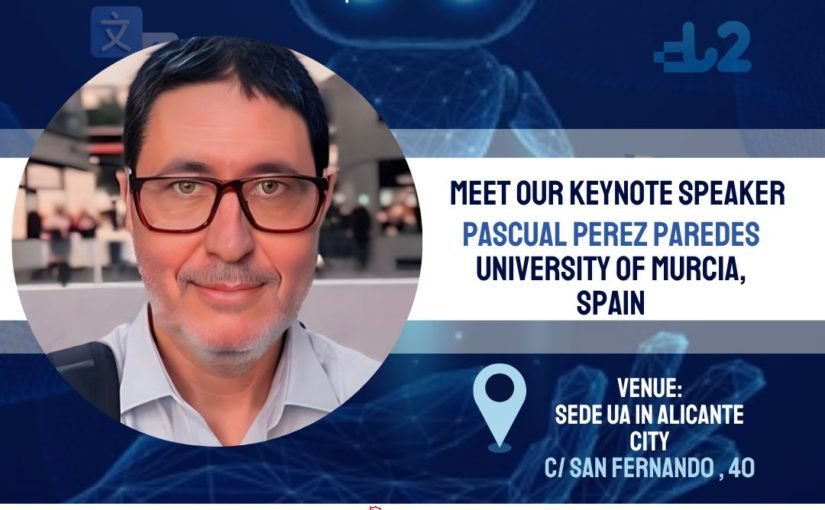
Conference website: https://web.ua.es/es/dl2/glotech-2025
Plenary: Critical AI literacy (CAIL): language education and applied linguistics as central disciplinary areas
Download here the comptencies outlined in the Pérez-Paredes, P. Curry, N. & Ordoñana-Guillamón, C. (2025). Critical AI literacy for applied linguistics and language education students. Journal of China Computer-Assisted Language Learning (JCCALL). Special Issue Theme: Cultivating AI literacy in language education. https://doi.org/10.1515/jccall-2025-0005
Some references
Curry, N., & McEnery, T. (2024). Corpus linguistics for language teaching and learning: A research agenda. Language Teaching.
Curry, N., McEnery, T., & Brookes, G. (2025). A question of alignment–AI, GenAI and applied linguistics. Annual Review of Applied Linguistics.
Curry, N., Mark, G., Lee, H., McEnery, T., Burton, G., Clark, T., & Shin, D. (2024). Applying corpus research indirectly to language teaching materials and assessment development.
Cheung, L., & Crosthwaite, P. (2025). CorpusChat: integrating corpus linguistics and generative AI for academic writing development. Computer Assisted Language Learning, 1-27.
Eaton, S.E. Postplagiarism: transdisciplinary ethics and integrity in the age of artificial intelligence and neurotechnology. Int Journal Education Integrety 19, 23 (2023). https://doi.org/10.1007/s40979-023-00144-1
Galaczi, E., & Pastorino-Campos, C. (2025). Ethical AI for language assessment: Principles, considerations, and emerging tensions. Annual Review of Applied Linguistics. Advance online publication. https://doi.org/10.1017/S0267190525100081
Handley, Z. L. (2024). Has artificial intelligence rendered language teaching obsolete?. The Modern Language Journal.
Kern, R. (2021). Twenty-five years of digital literacies in CALL. Language, Learning & Technology.
Kern, R. (2025). New Literacies: A Historical Perspective. In The Palgrave Encyclopedia of Computer-Assisted Language Learning (pp. 1-5). Springer Nature Switzerland.
Lawrence, N. (2024). The Atomic Human .Understanding Ourselves in the Age of AI. Penguin.
Lévy, P. (2025). Symbolism, digital Culture and Artificial Intelligence. RED. Revista de Educación a Distancia, 25(81). http://dx.doi.org/10.6018/red.630211
Liu, Y., Hu, G. (2024). Research Trends in Applied Linguistics (2017–2021): A Scientometric Review of 42 Journals. In: Meihami, H., Esfandiari, R. (eds) A Scientometrics Research Perspective in Applied Linguistics. Springer, Cham. https://doi.org/10.1007/978-3-031-51726-6_3
Lusta, A., Demirel, Ö., & Mohammadzadeh, B. (2023). Language corpus and data driven learning (DDL) in language classrooms: A systematic review. Heliyon, 9(12).
Ma, Q. (2025). Corpus Literacy and Data-Driven Learning. In The Palgrave Encyclopedia of Computer-Assisted Language Learning (pp. 1-7). Cham: Springer Nature.
Ma, Q., Crosthwaite, P., Sun, D., & Zou, D. (2024). Exploring ChatGPT literacy in language education: A global perspective and comprehensive approach. Computers and education: Artificial intelligence, 7, 100278. https://doi.org/10.1016/j.caeai.2024.100278
McCarthy, M., McEnery, T., Mark, G. and Pérez-Paredes, P. (2021) Looking back on 25 years of TaLC: In conversation with Profs Mike McCarthy and Tony McEnery. In Pérez-Paredes, P. & Mark, G. (Eds.). Beyond concordance lines: applications of corpora in language education. John Benjamins, pp. 57–74. https://doi.org/10.1075/scl.102.03mcc
McEnery, T. (2025). Twenty years of Corpora. Corpora, 20(1), 1-2.
McEnery, T., & Wilson, A. (1997). Teaching and Language Corpora(TALC). ReCALL, 9(1), 5–14. doi:10.1017/S0958344000004572
McInnes, R. (2025, April 11). Resist the gen-AI-driven university: A call for reclaiming thought in learning and teaching. ASCILITE TELall Blog. https://blog.ascilite.org/resist-the-gen-ai-driven-university-a-call-for-reclaiming-thought-in-learning-and-teaching/
Mizumoto, A. (2023). Data-driven learning meets generative AI: Introducing the framework of metacognitive resource use. Applied Corpus Linguistics, 3(3), 100074.
Mohsen, M. A., Althebi, S., Alsagour, R., Alsalem, A., Almudawi, A., & Alshahrani, A. (2024). Forty-two years of computer-assisted language learning research: A scientometric study of hotspot research and trending issues. ReCALL, 36(2), 230–249. doi:10.1017/S0958344023000253
Ohashi, L., & Alm, A. (2025). Conversational AI Literacy. In The Palgrave Encyclopedia of Computer-Assisted Language Learning (pp. 1-6). Cham: Springer Nature.
The Open University. (2025). A framework for the learning and teaching of critical AI literacy skills. https://www.open.ac.uk/blogs/learning-design/wp-content/uploads/2025/01/OU-Critical-AI-Literacy-framework-2025-external-sharing.pdf
O’Sullivan, Í. (2007). Enhancing a process-oriented approach to literacy and language learning: The role of corpus consultation literacy. ReCALL, 19(3), 269-286.
Oshchepkova, T., Tolstykh, O. M., Panasenko, E. V., Nazarova, N. A., & Petrova, N. V. (2024). Examining changes in foreign language educators’ attitudes towards the use of computer-assisted learning. Studies in English Language and Education, 11(2), 630-649.
Pérez-Paredes, P. (2025). Corpus linguistics and Computer Assisted Language Learning. In Hilary Nesi and Petar Milin (Eds.) International Encyclopedia of Language and Linguistics, 3rd Edition. Elsevier.
Pérez-Paredes, P., Mark, G. & O’Keeffe, A. (2025). Corpus linguistics for language learning research. Research Methods in Applied Linguistics (RMAL). John Benjamins. URL.
Pérez-Paredes, P. Curry, N. & Ordoñana-Guillamón, C. (2025). Critical AI literacy for applied linguistics and language education students. Journal of China Computer-Assisted Language Learning (JCCALL). Special Issue Theme: Cultivating AI literacy in language education. https://doi.org/10.1515/jccall-2025-0005
Pérez-Paredes, P. & Boulton, A. (2025). Data-driven Learning in and out of the Language Classroom. Cambridge University Press. https://doi.org/10.1017/9781009511384
Pérez-Paredes, P. & Curry, N. (2025). Corpus linguistics in Languages for Specific Purposes (LSP). In Thorsten Roelcke, Ruth Breeze and Jan Engberg (Eds.), Handbook of Specialized Communication, pp. 407-432. De Gruyter. https://doi.org/10.1515/9783110672633-020
Pérez-Paredes, P. & Mark, G. (Eds.) (2021). Beyond concordance lines: applications of corpora in language education. John Benjamins.
Pérez-Paredes, P. & Ordoñana-Guillamón, C. (2025). Future challenges and opportunities for data-driven learning. In McCallum, L. & Tafazoli, D. (Eds.) The Palgrave Encyclopedia of Computer-Assisted Language Learning. Springer. https://doi.org/10.1007/978-3-031-51447-0_350-1
Pérez-Paredes, P. Curry, N. & Aguado Jiménez, P. (forthcoming). Enriching AI literacy with corpus-based pedagogy.
Seargeant, P. (2023). The future of language. Bloomsbury.
Stockwell, G. (2024). ChatGPT in language teaching and learning: Exploring the road we’re travelling. Technology in Language Teaching & Learning, 6(1), 2273. https://doi.org/10.29140/tltl.v6n1.2273
Son, J. B., Ružić, N. K., & Philpott, A. (2025). Artificial intelligence technologies and applications for language learning and teaching. Journal of China Computer-Assisted Language Learning, 5(1), 94-112
Sun, W., & Park, E. (2023). EFL learners’ collocation acquisition and learning in corpus-based instruction: A systematic review. Sustainability, 15(17), 13242.
Sutoris, P. (2025, May 21). Our future may depend on the humanities. Wonkhe. https://wonkhe.com/blogs/our-future-may-depend-on-the-humanities/





